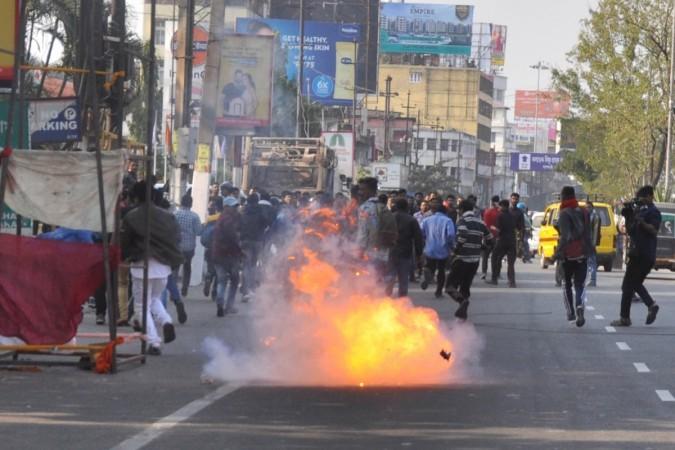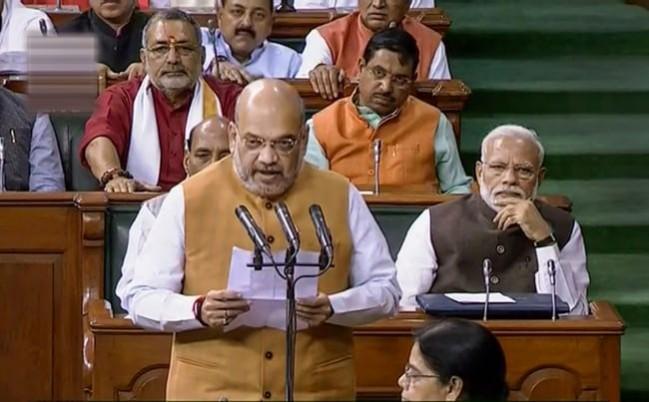Protests rocked Assam after the Rajya Sabha passed the Citizenship Amendment Bill 2019 (CAB) on Wednesday, with 125 members voting for and 105 against the Bill. The demonstrators hit the streets in thousands, burning tyres and wooden logs, prompting the administration to impose curfew in Guwahati and suspend mobile internet services in 10 districts of the state. The army undertook a flag march in Dibrugarh.
The bill was earlier passed in Lok Sabha with 311 votes in support and 80 against it on Monday midnight.
On the day when lawmakers debated the CAB in the Rajya Sabha, Assam was on the boil, with protesters raising slogans against the Central and state governments, and demanding unconditional withdrawal of the legislation. They fought pitched battles with the police, turning various parts of the stare into virtual battlegrounds.
Assam Chief Minister Sarbananda Sonowal remained stuck at the Lokpriya Gopinath Bordoloi International airport here for hours after landing in the state capital from Tezpur, as his convoy could not roll out due to the massive protests.
The administration tried to tackle the situation by imposing a curfew from 6 pm. The curfew will continue till 7 am on Thursday, a senior police officer said.
Mobile internet services were suspended in 10 troubled districts -- Lakhimpur, Dhemaji, Tinsukia, Dibrugarh, Charaideo, Sivasagar, Jorhat, Golaghat, Kamrup (Metro) and Kamrup districts -- for 24 hours to thwart any effort to spread rumours and misinformation, while a column of the army was kept on standby in Bongaigaon town.
The protests, which had started days back, intensified during the day after Union Home Minister Amit Shah tabled the legislation in the Upper House of the Parliament.
The protesters tried to march towards the state Secretariat here and threw bricks at the police and burnt tyres on the roads, creating a volatile situation. Secretariat employees also expressed solidarity with the protesters.

The protesters, including a large number of students, forcibly shut down shops and markets, and damaged a fire brigade vehicle till they were stopped by BSF, Rapid Action Force and police personnel about 500 metre from the Secretariat.
The law keepers retaliated by resorting to lathi-charge, using water cannons, firing rubber bullets and lobbing tear gas shells.
"We have used tear gas, rubber bullets, water cannon, and resorted to mild lathi-charge to scare them away. Some of our personnel were also injured," said Guwahati police commissioner Dipak Kumar.
Girls joined the protests in good numbers, holding aloft placards and posters reading "no citizenship on the basis of religion".
"This Act is unconstitutional. We Assamese indigenous people will never accept it," said a protester.
At least 25 protesters -- among them several students -- sustained injuries as they fought pitched battles with the police in different parts of the state.
At least 10 companies of paramilitary forces have been deployed in the state.
What does the bill say?
The bill that seeks to provide Indian nationality to Hindus, Christians, Sikhs, Parsis, Jains and Buddhists fleeing persecution from Pakistan, Afghanistan and Bangladesh.
The Citizenship (Amendment) Bill seeks to amend the Citizenship Act, 1955 to make Hindu, Sikh, Buddhist, Jain, Parsi, and Christian illegal migrants from Afghanistan, Bangladesh, and Pakistan, eligible for citizenship of India.
Highlights of the Citizenship (Amendment) Bill
- Granting nationality to non-Muslim immigrants from neighbouring countries.
- The Citizenship Act, 1955, one of the requirements for citizenship was that the applicant must have resided in India in the last 12 months, as well as for 11 of the previous 14 years.
- Now the amendment relaxes the second requirement — from 11 years to six years.
- Provides that the registration of Overseas Citizen of India (OCI) cardholders may be cancelled if they violate any law.
What happened in the Rajya Sabha on Wednesday?
The members of Shiv Sena, the latest Congress ally, were absent at the time of voting. The Janata Dal (United) voted for the Bill.
Seeking all members' support to the legislation, Home Minister Amit Shah requested opposition not to use politics to divide the society.
Replying to the debate, Shah said 44 members presented their views, suggestions and objections in the House. "I want present few facts. This Bill should have not been brought. There was no need to amend the Citizenship Act if country was not divided. Also, had some previous government acted, we would have not brought the Bill," he said.
Stressing the need of the Bill, Shah said, "For how long we will keep on delaying the problems of the country. The Liaquat-Nehru pact (or the Delhi Pact) happened on April 8, 1950. Both the countries agreed to treat minorities with dignity and allow them to freely follow their religion. It was a promise. But eventually the promise was broken."
He assured the House that the Bill would allow illegal immigrants to say the truth that they were immigrants and seek citizenship. "The cries and tears of these people were never heard or cared for for so many years," the Minister said.
On why minorities from Bhutan, Myanmar and Sri Lanka had been left out, Shah said the government had allowed citizenship to people coming Sri Lanka and Uganda and amendments were made accordingly. "We named three countries only to help people coming from these countries. We don't need to distract the problems now," he said and added, the Bill was introduced in 2015 and gone through parliamentary committees.
"Solving problem is the priority, keeping citizens in mind, is aim of our government," Shah said.
Remarking that the Constitution of Afghanistan, Bangladesh and Pakistan states that they are Islamic countries, Shah said, "Are Muslims minority in these three countries? When countries' religion is Islam then cases of persecution of Muslims very less."
The Home Minister said we had provisions for Muslim victims of persecution and they had been given citizenship on case to case basis. He also highlighted how Chidambaram as the Home Minister had accorded citizenship to Hindus and Sikhs in Rajasthan.

Asking the opposition to stop befooling minorities, Shah said, "What the Congress is doing is secularism. And what we are doing is against the Constitution."
"I have always said minorities in India need not be scared of anything. This CAB will not affect any Mulish brother and sisters. Why opposition is creating a divide," the Minister said.
"On September 26, 1947, Gandhi said, Hindu and Sikh living in Pakistan can fearlessly come to India. It is duty of India to give them shelter and job," he substantiated his arguments by quoting Mahatma Gandhi.
Criticising the Congress, Bhupender Yadav (BJP) said they were in power for 10 years but did nothing for the persecuted people. "This Citizenship Amendment Bill was discussed during the UPA and the NDA governments. The UPA ignored it and the NDA took up the issue and is ensuring that immigrants should be treated with equality," Yadav said.
KJ Alphons (BJP) said the Bill would allow persecuted minorities in neighbouring countries the right to live.
The Janata Dal-United supported the Bill. Naga Peoples Front (NPF) MP KG Kenye extended his support to the Bill and said the issue was being discussed in the House completely out of context.
Opposing the Bill, Kapil Sibal (Congress) said the CAB had a legal colour of the two-nation theory and added, religion couldn't be a factor in the acquisition of citizenship.
Terming the CAB "blatantly unconstitutional", P Chidambaram (Congress) said the government was introducing a new category called citizenship by the arbitrary executive feat.
"I dare the government to lay the opinion of the Law Department. I dare the government to invite the Attorney General to answers the questions. What we are doing today is breaking the Constitution from within. A small part of the Constitution is being racked and being demolished by these insidious people," Chidambaram said.
Taking a dig at the Prime Minister Narendra Modi, Sanjay Raut (Sena) said that India's muscular and powerful government would finish Pakistan if they didn't like their language. "We have a very powerful government. If you do not like the language of Pakistan we should finish it," the Sena leader said.

















